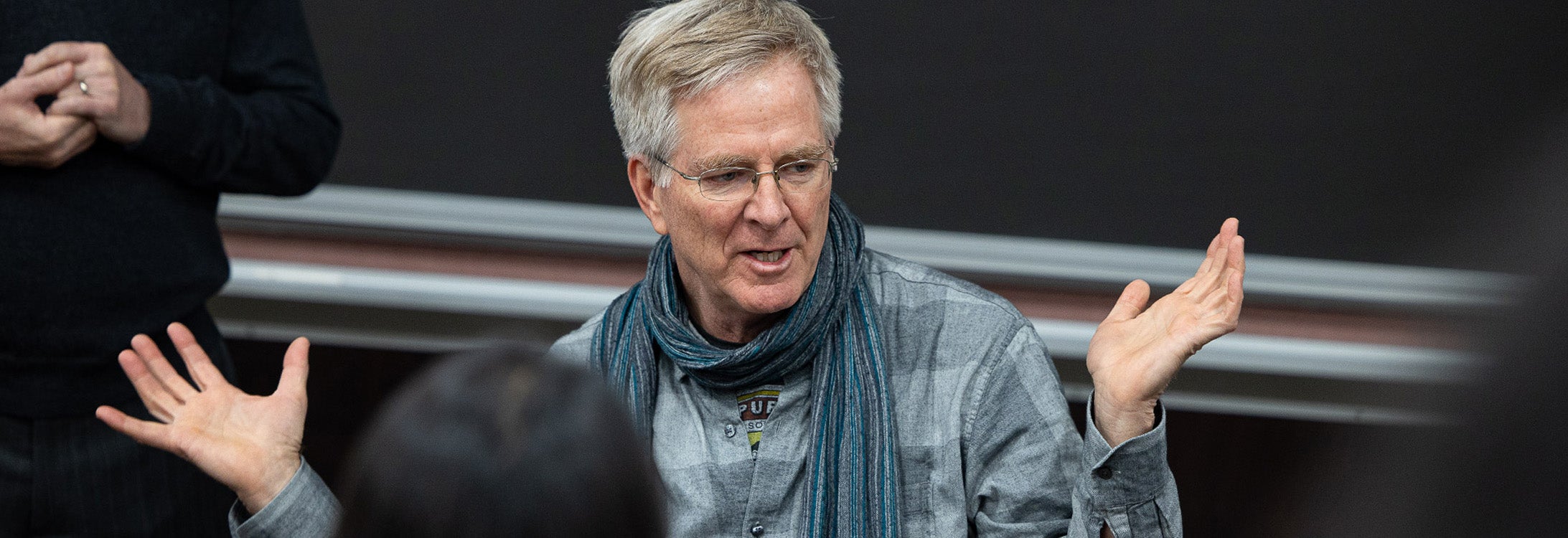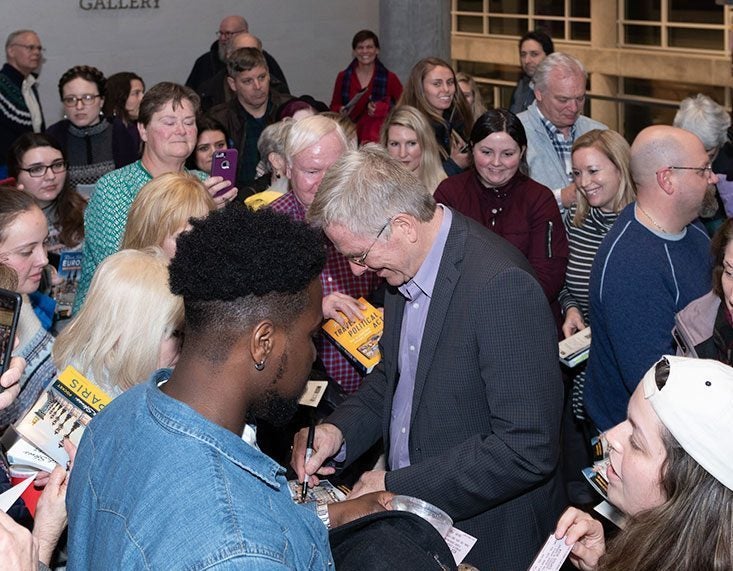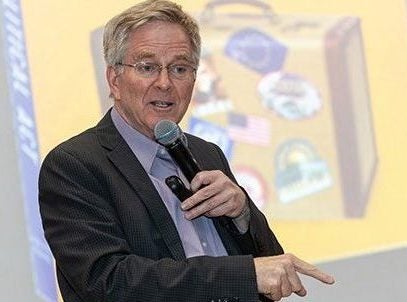TRANSFORMATIONAL TRAVEL
ECU welcomes expert Rick Steves to the Voyages of Discovery Series
Hundreds of people braved snowy weather Thursday night to hear expert Rick Steves’ talk about a lifetime of travel — about 120 days every year — with a 9-by-22-by-14-inch carry-on suitcase.
At East Carolina University as part of the Voyages of Discovery Series, the American travel writer, TV personality and activist met with students in the afternoon before his public talk, “Travel as a Political Act,” in the Main Campus Student Center ballrooms.
During the event, Charlie ’55, ’57 and Nancy Bedford of Atlanta were honored for establishing an endowment in the Thomas Harriot College of Arts and Sciences for students to study abroad. (See accompanying story).
Steves said he was inspired by the ECU students he met broadening their perspective through foreign study, although he didn’t know about the university before his visit.
“ECU to me didn’t mean East Carolina University. In TV terms ECU means ‘extremely close up,’” Steves said. “When you’re able to send students from this university abroad they’re getting an ECU look, I think, at this beautiful world, and that’s a beautiful thing. And I’m going to remember what ECU is now in that regard.”
An authority on European travel, Steves has written more than 50 country, city and regional guidebooks. He employs 150 people in the Seattle-based business he founded in 1976, and he operates a successful tour program, weekly public radio program and TV show. Steves also works with advocacy groups focusing on economic and social justice, drug policy reform and ending hunger.
His talk featured anecdotes and images ranging from drinking limoncello with a priest on his Italian patio to his first visit to the glass-domed top of Germany’s capital building — a powerful architectural symbol that provides a direct view into politicians’ offices. The dome offers a 360-degree panoramic view of Berlin while symbolizing a new republic.
“History becomes real when you travel,” he said. “Go to Europe with an appetite for context. If you know a little bit about something you’re looking at, you’ve doubled your experience.”
He said travel is transformational because it provides a close-up view of other cultures and history, and helps people broaden their perspectives. “I love that we meet people who see things differently than we do,” he said. “Getting to know people — that’s what carbonates your experiences. If I’m not connecting with people then I’m not doing a good job.”
Steves said his real mission is as a travel teacher. “The purpose of a travel writer is to equip and inspire people to get out of their comfort zones, and to get to know the other 96% of humanity,” he said.
Steves spends a third of his time doing research for his guidebooks. Another third is spent filming his TV show for public television; it takes six days in Europe to film one 30-minute segment. The remaining time is spent helping with his tours.
His latest project, “Hunger and Hope: Lessons Learned from Ethiopia and Guatemala,” will soon debut on public television and focuses on ending hunger and poverty. Development aid is a smart investment because it creates independence, Steves said, for 10% of the world’s population that lives on less than $2 a day. For the cost of one set of braces, a well could be built to provide a safe drinking source in village, he said.
Earlier in the afternoon, a group of about 30 students from the Honors College and international studies had an opportunity to meet and ask Steves questions.
EC Scholar Naimi Pothiwala of Apex grew up watching Steves on public television. “Me and my dad, we’re big fans,” she said. “Growing up, I always watched him. He was a big part of our weekends.”
Pothiwala, a sophomore majoring in public health studies with a minor in Hispanic studies, plans to study in Spain next spring and travel across Europe. She said meeting Steves at this time in her life was special. “He really influenced me growing up in wanting to be interested in other cultures,” she said.
Steves’ lectures and shows can be viewed free on his website at www.ricksteves.com.
Established in 2007, the Voyages of Discovery Series advances the spirit of exploration and discovery that is the hallmark of the arts and sciences. Each year, the series features thought-provoking and accomplished leaders from a variety of disciplines who provide insight into important issues in today’s society, and who share their experiences and perspectives.
The final lecture for the 2019-20 season will feature Libby Riddles, the Iditarod dog sled race’s first woman champion, on March 26.
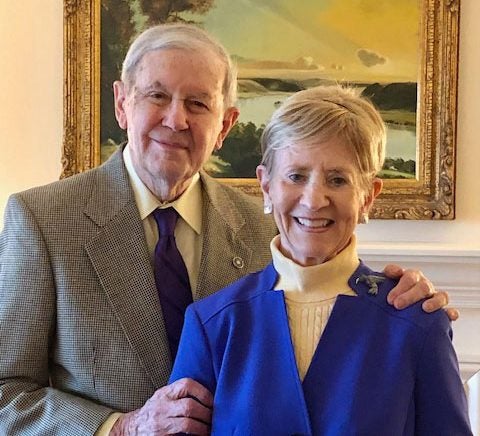
Nancy and Charlie Bedford (Contributed photo)
DONOR GIFT HELPS STUDENTS
Inspired by their own love of travel and global experiences, donors Charlie and Nancy Bedford created a study abroad program to help ECU students enrich their education through cultural immersion.
The Charlie and Nancy Bedford Study Abroad Scholars Program will support students and faculty participating in a three-week trip to Strasbourg, France this summer. Their funds cover scholarships for 10 students and a stipend for the faculty advisor.
The program has the flexibility to adapt to the needs of the Thomas Harriot College of Arts and Sciences, and could be used for an exchange program, internship or research-oriented travel in the future. It could also be used to establish an ECU site in another country, similar to the Italy Intensives program.
“This is a transformative gift for ECU,” Interim Dean Allison Danell said. “Since 2014, the Bedfords have supported scholarships in the College of Arts and Sciences, then created their own scholarship endowment in 2018. Now in 2020, they have broadened and strengthened their study abroad support at ECU to create a program that sends cohorts of students abroad.”
Charlie Bedford grew up on a tobacco farm in Wayne County and didn’t leave the country until after graduating from ECU in 1955 with a degree in education. He received his master’s from ECU in education administration in 1957.
Bedford began his career as teacher before entering the higher education sphere as a college counselor and then dean of admissions at Hanover College in Indiana. He later worked for the College Board in Atlanta helping increase the number of high schools offering Advanced Placement classes.
“It is our hope that ECU students who study and travel abroad will learn about other cultures, experience friendships with internationals, and bring back to their communities a desire to help others know more about our global world,” he said.
Nancy Bedford grew up in Washington, D.C., and attended the College of William and Mary. A grant allowed her to spend a year of graduate study in Aix-en-Provence, France, as a French Government Fellow. It was her first time out of the country.
She returned to teach French in Arlington, Virginia, where she met Charlie. With her love of France and languages and Charlie’s passion for meeting and getting to know people from all backgrounds, they traveled extensively for many years, including visits to France, England, Portugal, China, South Africa, New Zealand, Australia and India.
“It is our greatest joy to be able to establish this study abroad program for the benefit of ECU students pursuing degrees in the College of Arts and Sciences,” Nancy Bedford said. “We look forward to increasing the number of ECU students who will profit from being immersed in another culture, learning a new language, or becoming fluent in one that they have chosen to master. May they be challenged to forge ahead in unknown territories, always remembering that, ‘You can smile in any language!’”
-by Erin Shaw
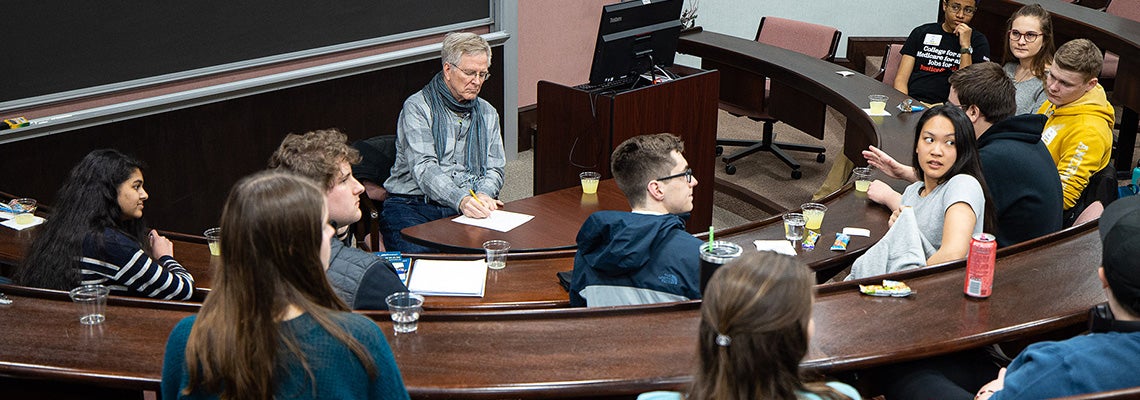
Steves jots down questions from students in the Bate Building. (Photo by Cliff Hollis)
